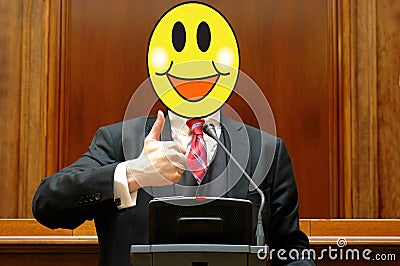Last night was the mid-term US elections - a lot of Governors and Senators were elected, plus all of the House of Representatives. Most often as I watched victory speeches, one phrase stuck out above the rest - "You didn't vote for me, tonight, you voted for yourselves."
This is, by far, my favorite lie of election season. It's not even limited to election season, its the lie woven into the entire fabric of US democracy that keeps the whole structure afloat.
We don't vote for the candidate most capable of doing the job - every single voter could name a half dozen age-eligible acquaintances more appropriate for the position - we choose between two narratives, representative of larger institutionalized power positions, carefully crafted to appeal to our emotions and fears.
This system is perpetuated by rhetoric of representation, as if the mere ability to vote ensures free and fair elections or could ever hope to deliver on its promises. These applause lines, "You stood up for Arkansas today," serve only to perpetuate the myth that orderly authority is the only means by which we can effectively live together.
It trickles down. How often does a neighbor talk to a neighbor about a noisy dog or an overgrown yard before they call the police? Do you even know your neighbors' names? Are we informing ourselves about the social safety net by talking to people in our own town whose lives it affects (both positively or negative) or do we get our information from talking heads on TV?
Every winner, regardless of party of ideology, adopts the language of populism - a good fight against smarmy elitists (either of ideological or economic stripe), because all of them are hiding the real system of elites who make decisions. Power's only purpose is to maintain power.
The real "players" in this system are empowered interests. Yes, they spend and spend to influence elections, but not out of some ideological bent; they spend to make sure the people elected are the people who listen to them.
Our own collective association with the larger narrative plays right into this scheme. We believe by voting we can defeat the powers, when our participation only enables them.
That's not to say Democracy is bad. There are plenty of ways to collectively decide how we'll best live. Usually the best way to do this is face to face. We don't have to vote to meet the people and problems really affecting our daily lives head on. In many nations, even those with similar representative systems, there is a stark contrast between the business of government and the life of the nation.
We don't want government interfering in everything we do, but we continue to perpetuate a system that can function only by doing exactly that.
When you vote, if you vote, try to remember you're never, ever voting for yourself. You're voting for a ridiculously ambitious, well-crafted, well-funded illusion of freedom and participation. (It's interesting to note how often the loser speak extemporaneously and rambles, while the winner never does.)
The real revolution is the revelation that we need no politicians to control us or free us from control. Our communities, the people with whom we live and work each day, have all the power - on this fact nearly everyone agrees. What we so often fail to see is how the current voting system incentivizes our giving it away.
You can't change the system from within the system, only from without. All of these self-proclaimed outsiders become something different when they enter in. The only real change comes in starving the system of power, which sounds insidious, but starts by simply knowing and talking to the guy across the street. You are worth far more than your vote, and so is he.

No comments:
Post a Comment